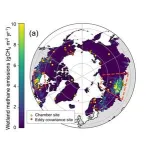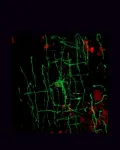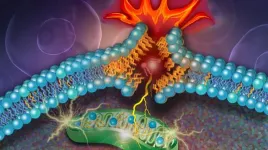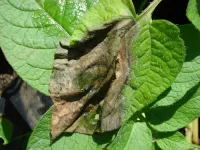(Press-News.org) By integrating an ensemble of privacy-preserving algorithms, a KAUST research team has developed a machine-learning approach that addresses a significant challenge in medical research: How to use the power of artificial intelligence (AI) to accelerate discovery from genomic data while protecting the privacy of individuals.[1]
“Omics data usually contains a lot of private information, such as gene expression and cell composition, which could often be related to a person’s disease or health status,” says KAUST’s Xin Gao. “AI models trained on this data – particularly deep learning models – have the potential to retain private details about individuals. Our primary focus is finding an improved balance between preserving privacy and optimizing model performance.”
The traditional approach to preserving privacy is to encrypt the data. However, this requires the data to be decrypted for training, which introduces a heavy computational overhead. The trained model also still retains private information and so can only be used in secure environments.
Another way to preserve privacy is to break the data into smaller packets and train the model separately on each packet using a team of local training algorithms, an approach known as local training or federated learning. However, on its own, this approach still has the potential to leak private information into the trained model. A method called differential privacy can be used to break up the data in a way that guarantees privacy, but this results in a “noisy” model that limits its utility for precise gene-based research.
“Using the differential privacy framework, adding a shuffler can achieve better model performance while keeping the same level of privacy protection; but the previous approach of using a centralized third-party shuffler that introduces a critical security flaw in that the shuffler could be dishonest,” says Juexiao Zhou, lead author of the paper and a Ph.D. student in Gao’s group. “The key advance of our approach is the integration of a decentralized shuffling algorithm.” He explains that the shuffler not only resolves this trust issue but achieves a better trade-off between privacy preservation and model capability, while ensuring perfect privacy protection.
The team demonstrated their privacy-preserving machine-learning approach (called PPML-Omics) by training three representative deep-learning models on three challenging multi-omics tasks. Not only did PPML-Omics produce optimized models with greater efficiency than other approaches, it also proved to be robust against state-of-the-art cyberattacks.
“It is important to be aware that proficiently trained deep-learning models possess the ability to retain significant amounts of private information from the training data, such as patients’ characteristic genes,” says Gao. “As deep learning is being increasingly applied to analyze biological and biomedical data, the importance of privacy protection is greater than ever.”
END
Shuffling the deck for privacy
2024-02-15
ELSE PRESS RELEASES FROM THIS DATE:
Root microbes may be the secret to a better tasting cup of tea
2024-02-15
You’d think the complex flavor in a quality cup of tea would depend mainly on the tea varieties used to make it. But a study appearing in the journal Current Biology on February 15 shows that the making of a delicious cup of tea depends on another key ingredient: the collection of microbes found on tea roots. By altering that assemblage, the authors showed that they could make good-quality tea even better.
“Significant disparities in microbial communities, particularly nitrogen metabolism-related microorganisms, were identified in the roots of tea plants with varying qualities through ...
Winners of 4th annual Rising Black Scientists Awards announced
2024-02-15
Cell Press, Cell Signaling Technology (CST), and the Elsevier Foundation are proud to announce the winners of the 4th annual Rising Black Scientists Awards: Jaye Wilson of Yale University, Kevin Brown Jr. of California State University San Marcos, Senegal Mabry of Cornell University, and Akorfa Dagadu of the Massachusetts Institute of Technology.
This year had the greatest number of submissions thus far, with the winners being selected from a pool of more than 350 applicants from across the life, health, physical, earth, environmental, and data sciences. Essays from the winners and honorees appear in the journals Cell and ...
Ancient retroviruses played a key role in the evolution of vertebrate brains
2024-02-15
Researchers report February 15 in the journal Cell that ancient viruses may be to thank for myelin—and, by extension, our large, complex brains. The team found that a retrovirus-derived genetic element or “retrotransposon” is essential for myelin production in mammals, amphibians, and fish. The gene sequence, which they dubbed “RetroMyelin,” is likely a result of ancient viral infection, and comparisons of RetroMyelin in mammals, amphibians, and fish suggest that retroviral infection and genome-invasion ...
Researchers discover that a rare fat molecule helps drive cell death
2024-02-15
Columbia researchers have found that a rare type of lipid is a key driver of ferroptosis, a form of cell death discovered by Columbia professor Brent Stockwell.
The findings provide new detail on how cells die during ferroptosis and could improve understanding of how to stop ferroptosis in contexts where it is harmfully occurring– in neurodegenerative diseases, for example– or induce it in contexts where it could be useful, such as using it to kill dangerous cancer cells.
The new research found that a rare type of ...
Plant disease: Mapping the spread of potato blight prior to the Irish potato famine *IMAGES*
2024-02-15
The first accurate maps of outbreaks of potato blight — a disease caused by the fungus-like pathogen Phytophthora infestans that was responsible for the Irish potato famine between 1845 and 1852 — in the USA between 1843 and 1845 are presented in a study published in Scientific Reports. The findings improve our understanding of the spread of potato blight before the disease reached Europe.
Jean Ristaino and colleagues mapped outbreaks of potato blight in North America between 1843 and 1845 by analysing historic agricultural reports published in the USA during this period. The authors found that the disease was first reported ...
New treatment for a rare and aggressive cancer improves survival rates in breakthrough clinical trial
2024-02-15
An innovative treatment significantly increases the survival of people with malignant mesothelioma, a rare but rapidly fatal type of cancer with few effective treatment options, according to results from a clinical trial led by Queen Mary University of London.
The phase 3 clinical trial, led by Professor Peter Szlosarek at Queen Mary and sponsored by Polaris Pharmaceuticals, has unveiled a breakthrough in the treatment of malignant pleural mesothelioma (MPM), a rare and often rapidly fatal form ...
Weight loss treatment and longitudinal weight change among patients with obesity
2024-02-15
About The Study: In this study of primary-care patients with obesity, all weight management treatments (nutrition counseling, very low-calorie meal replacement, anti-obesity medications, and bariatric surgery) increased the patient-level probability of achieving 5% or greater weight loss, but current rates of utilization are low and insufficient to reduce weight at the population level.
Authors: Dina H. Griauzde, M.D., M.Sc., of the University of Michigan in Ann Arbor, is the corresponding author.
To access the embargoed study: Visit our For The Media website at this link https://media.jamanetwork.com/
(doi:10.1001/jamanetworkopen.2023.56183)
Editor’s ...
Traumatic brain injury and subsequent risk of brain cancer in US veterans of the Iraq and Afghanistan wars
2024-02-15
About The Study: Moderate or severe and penetrating traumatic brain injury (TBI) were associated with the subsequent development of brain cancer in this study of more than 1.9 million veterans of the Iraq and Afghanistan wars. However, mild TBI was not associated with later brain cancer diagnoses.
Authors: Ian J. Stewart, M.D., of the Uniformed Services University of Health Sciences in Bethesda, Maryland, is the corresponding author.
To access the embargoed study: Visit our For The Media website at this link https://media.jamanetwork.com/
(doi:10.1001/jamanetworkopen.2023.54588)
Editor’s ...
Using written records – and tweets – as a roadmap for plant disease spread
2024-02-15
North Carolina State University researchers used text analytics on both historic and modern writing to reveal more information about the effects and spread of the plant pathogen – now known as Phytophthora infestans – that caused the 1840s Irish potato famine and that continues to vex breeders of potatoes and tomatoes.
The study examined keyword terms like “potato rot” and “potato disease” after digitizing historic farm reports, news accounts and U.S. Patent Office agricultural records from 1843 ...
Telehealth is as safe as a visit to the clinic for abortion pills
2024-02-15
Large national study finds that video visits, texting and mailing pills are all effective, as the U.S. Supreme Court considers limiting access to telemedicine abortion.
Medication abortion can be delivered safely and effectively through telemedicine, according to new research from UC San Francisco that comes as the U.S. Supreme Court is about to hear a case that could severely restrict access to one of the two pills that are used to induce abortions.
Researchers analyzed data from more than 6,000 patients who obtained abortion ...





